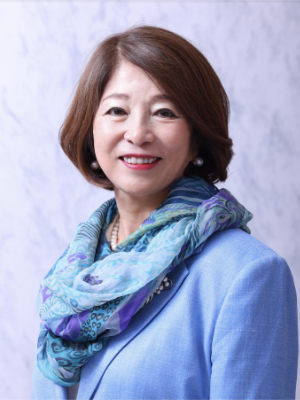ご挨拶

2022年6月の日本コーヒー文化学会総会において第四代会長職を拝命いたしました。微力ではありますが日本コーヒー文化学会のために全力を尽くして務めさせていただく所存ですので、なにとぞよろしくお願い申し上げます。
2020年が明けてまもなく、コロナという未曽有のパンデミックが世界中を席巻し、2022年にはロシアのウクライナ侵攻による政治的・経済的影響、東北・北陸を中心とした大雨による被害など、災厄が立て続けに起こっています。
そのような状況下で、今後の当学会の方向性につきまして、まだ明確な答えが出せない状態ではありますが、会長職を浅学菲才ながら引き受けさせていただいたのは、ひとえに、「明るく」「楽しく」コーヒー好きの同志と共に語り合いたいという願いからです。
この学会ほど多様性のある学会はないのではないでしょうか。文化的あるいは科学的に研究する学識経験者、生産者、流通業界、経済的な立場からなど、様々なアプロ―チから日々奮励する方々、あるいは立場や社会的役割からではなく、ひたすらコーヒーを一人であるいは家族や友人たちと飲むため、知識と技術向上を重ねる会員の方々の存在も大きいです。
2013年に日本の和食がユネスコの世界向け文化遺産に指定されました。このように食の文化において繊細な味覚を持つ我々日本人が淹れるコーヒーがまずいはずがありません。
また、日本人は茶を単に飲料というだけでなく茶道という文化に、匂いを嗅ぐというたしなみを香道という文化に昇華させました。今やコーヒーに対する志向も、立派な日本文化といえるのではないでしょうか。
私の専門は日本近代工芸史ですが、現在、大学の授業でも「日本の喫茶文化」と題して日本のコーヒーの歴史について、留学生を中心に講義しております。また医学部の授業で、ミステリーの女王と呼ばれたアガサ・クリスティーが作品の中で書いたコーヒーについての講義もしております。
アガサ・クリスティーは自らが記した自伝の中で、嫌いなものとして「群衆、人のあいだにぎゅう詰めにされること、大声、雑音、長ったらしい話」を筆頭に挙げています。まるで現在のコロナ対策を予測して書いたかのような文章です。そしてイギリス人ということで紅茶好きかと一般的には思われがちですが、実はコーヒーが大好きでした。
彼女は好きなものの中に「コーヒーの匂い」をあげています。アガサ・クリスティーが実際に嗅いだコーヒーの匂いがどのようなものだったかは推測の域をでませんが、夫である考古学者のマックス・マローワン卿の調査に伴って中東や様々な国を訪れていますので、コーヒーもいろいろ楽しんだことでしょう。彼女が経験した「コーヒーの匂い」を実際に海外で体感できなくても、日本には世界中の生産国からおいしいコーヒー豆が届きます。
一人で淹れるコーヒーも、みんなで語り合いながら飲むコーヒーもどちらも格別の味です。
ぜひ、コーヒーについてもっと知りたい、もっと語り合いたいという方々の入会をお待ちしております。
- 日本コーヒー文化学会会長
- 東京藝術大学特任教授 哲学博士
- 井谷善惠Yoshie ITANI, D.Phil.(Oxon)
Greetings
It gives me the greatest pleasure to announce that at the general meeting of the Japan Coffee Culture Society, held in June of 2022, I was appointed the fourth president of the Society. I henceforth plan to make every effort to contribute to the Japan Coffee Culture Society, and I hereby solicit both your kind assistance and support with the sincerest appreciation for your unreserved cooperation.
Soon after entering the year 2020, an unprecedented pandemic of the Novel Coronavirus, or COVID-19, swept across the world. Additionally, the year 2022 has so far witnessed continuous disasters, including the political and economic
repercussions of Russia's invasion of Ukraine and widespread damage caused by droughts and heavy rains around the world, including in Japan's Tohoku and Hokuriku regions.
Under these circumstances, I am still unable to give a clear answer as to the future direction of our association. However, I accepted the position of president because I earnestly desire to enjoy further conversations with my coffee-loving colleagues in a bright and cheerful manner.
I'm sure that there's no other academic society in the world made up of quite the wide variety of people as this coffee society. There are people here from various walks of life, such as academic experts engaged in cultural or scientific research, producers, distributors, and economists, all of them working hard every day. There are also members of the society who have dedicated themselves to improving their knowledge and skills in order to simply drink coffee alone or with family or friends, without regard to their status or role in society. These people are all precious to our coffee society.
In 2013, Japanese cuisine, or Washoku, was designated by UNESCO as an Intangible World Cultural Heritage. With such a delicate sense of taste developed in Japanese food culture, there is no reason why coffee brewed by the Japanese
people should ever be bad.
The Japanese have also sublimated tea from a mere beverage into the culture of the tea ceremony, and the art of scents into the culture of Kōdō, or the art of incense. Of late, the orientation toward coffee can also be said to have become an integral part of Japanese culture.
My specialty is the history of modern Japanese art crafts, and I am currently lecturing on the history of coffee in Japan, mainly to international students, in a university class entitled "Coffee Culture in Japan." I am also giving lectures in medical school classes on coffee as written about in the works of Agatha Christie, who is often referred to as the Queen of Mystery.
In her autobiography, Agatha Christie lists "crowds, being crammed in between people, loud voices, noise, and long-winded speeches" as some of her pet peeves. It is as if she wrote this in anticipation of our current COVID-19 pandemic countermeasures. And while people generally assume that she was a tea drinker, since she was English, she actually loved coffee. She lists "the smell of coffee" among her favorite things.
How that coffee actually smelled may be a matter of conjecture, but Agatha Christie certainly must have enjoyed a wide variety of coffee tastes and smells as she traveled the Middle East and numerous other countries with her husband, archaeologist Sir Max Mallowan, on his travels for research. Even though we are unable to actually experience the "coffee smell" that Agatha encountered in these far-flung countries, in Japan we still have relatively easy access to the many delicious coffee varieties on offer from producing nations around the world.
Whether brewing coffee alone or drinking it with others while talking about it, both are exceptional tastes.
Those who wish to learn and talk more about coffee are cordially invited to visit and become members of our coffee society.
- Yoshie ITANI, D. Phil. (Oxon)
- President of the Japan Coffee Cultural Society
and Special Project Professor at Tokyo University of the Arts
コーヒー文化研究
学会誌「コーヒー文化研究」はコーヒー研究者による論文や、総会・集会時に行われた講演内容を収録しており、その内容に学会会員ほか多くの方々から、高い評価をいただいております。既刊号を1冊2,000円(税込み、送料別)にて販売いたしております。また、会員の方は特別価格1,000円でお買い求めいただけます。(但し、最新号を除く。)なお、大変申し訳ございませんが、No.8、No.15は、在庫僅少の為、販売を中止いたしております。購入ご希望の方は事務局までご連絡下さい。
日本コーヒー文化学会事務局
- 担当: 山岡、堀江
- TEL (078)302-8880
- FAX (078)302-8824


 過去の活動 PDF
過去の活動 PDF